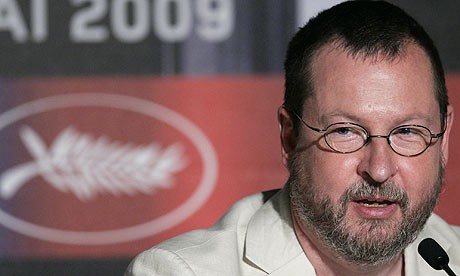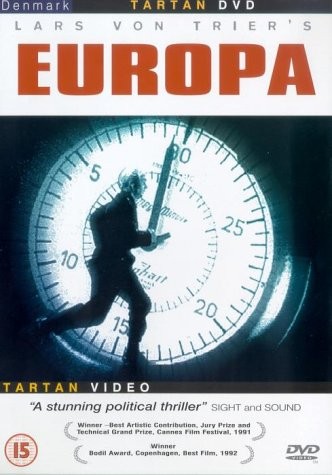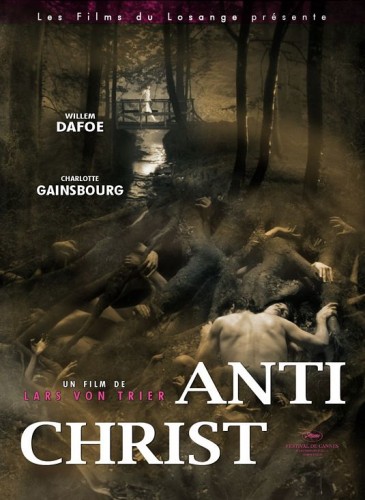samedi, 22 janvier 2011
Lars von Trier's Antichrist

by David Carrillo Rangel
Ex: http://www.new-antaios.net/
I originally intended to deal with fantasy literature but I realised it would be too risky without mentioning the precedents of myth, symbol and universal archetypes. I also intended to write about utopia and about the duplicity inherited from folklore and fairy tales. Altogether it might be a little bit too much. Therefore, I would rather talk about film critics’ ignorance, for it seems they have not read many books and show a general lack of humanistic knowledge, regardless of how many films they might have seen. Lars von Trier’s latest and controversial film is finally out in DVD[1] and those critics dare to prescribe about which is already a part mass culture and postmodernity without being able to see all the details. So, I will be dealing here with that film, Antichrist, because it is definitely linked to all the topics I mentioned at the beginning. Obviously, I cannot deal hear with an exhaustive analysis for lack of space, but any of you can later investigate through Google and see what lies beneath the image of the three beggars that embody the final part of the film.
 I will not explain the argument since you would only need to watch the movie, but, indeed, I can assure you it is not all about women’s evil. May be, it is more about the perception of evil in women that dominated Western culture during centuries –let us not forget that some time in history they were even claimed to lack a proper soul-. We have got clear examples of this in Eve, the first one, the one who succumbed to the Serpent in the Garden of Eden; in witches, burnt alive; in nuns and all the heretic tradition within the Western world. You have got plenty of bibliography about these that you can read on your own.
I will not explain the argument since you would only need to watch the movie, but, indeed, I can assure you it is not all about women’s evil. May be, it is more about the perception of evil in women that dominated Western culture during centuries –let us not forget that some time in history they were even claimed to lack a proper soul-. We have got clear examples of this in Eve, the first one, the one who succumbed to the Serpent in the Garden of Eden; in witches, burnt alive; in nuns and all the heretic tradition within the Western world. You have got plenty of bibliography about these that you can read on your own.
I will now try to focus in the most controversial points in the film. Many reviews give Willem Dafoe’s character as a psychiatrist when, in fact, he is a psychologist. He rejects all medication to fight the sense of guilt the mother is feeling when confronted with the trauma that acts as a catalyst for the development of the plot. The psychologist’s strategies differ to medication trying to put order in madness. Madness which we can relate to drunkenness, dream and states of altered conscience. In fact, there is a bridge, which is a key in the development of the plot and bridges, as you all might know, always symbolise a passage between two different worlds. Nobody seems hardly to remember that in Mediaeval Europe, Church promoted the building of such bridges. Nowadays the bridge remains important as a fundamental symbol of union between to separate lands. In Francis Ford Coppola’s Apocalypse Now the toughest fight is the one when a bridge was being built at day and destroyed at night, in a seemingly perpetual fashion. One beyond that point, the main characters are able to get into the sacred –the objective of their quest-.
Claude Lecouteux[2] studied the double world as perceived during the Middle Ages whereas Régis Boyer[3] did the same regarding Scandinavia. That symbol, its meaning related to anguish, should not go unnoticed. Moreover, von Trier admitted himself the influence gathered from Strindberg[4]’s Inferno, the result of a depression and the contact with Emanuel Sewendeborg’s philosophy. It has also gone unnoticed the dedication to Andréi Tarkovski –whose film, Mirror and Sacrifice, we should cross-compare with Antichrist-.
[1] Antichrist, Cameo edition, with another DVD containing all the Extras.
[2] Lecouteux, Claude (2004), Hadas, brujas y hombres lobo en la edad media, Historia del Doble, José J. de Olañeta, Palma de Mallorca
[3] Boyer, Régis (1986), Le Monde du Double, La magie chez les anciens Scandinaves, Paris, Berg
[4] Strindberg, August (2002), Inferno, Barcelona, El Acantilado
There is a very significant take: the attic where SHE keeps her notes from her thesis about gynocide –murder of women-. All the images appearing there are real.
In the first chapter of Inferno, we are presented with a scene similar to Goethe’s Faust but in Inferno Lucifer is the son of Light and Christ is Lucifer’s son. Strindberg is suggesting that Creation is no more than a fancy game to entertain gods and that these creatures sooner or later will have to return to dust, which is, precisely, Lucifer’s task. This interpretation makes us think about the Cathars and the annihilation of the world by halting its reproduction cycle. Lars von Trier is not implying that women are evil, he is referring to a mysticism pushed to its limits, where salvation relies on annihilation. That is the meaning of the last take: Epilogue.
Genital mutilations that appear here have been widely criticised. However, the fact that SHE beats his crotch with wood, the fact that HE ejaculates blood and HER final mutilation are not gratuitous. In fact, von Trier leaves nothing to chance; he gets really involved in each of his works in overwhelming way. You need only to take a look at the extras that come with the DVD. How could we believe that such director would create a chain of unconnected events? Lack of understanding is part, in fact, of the mysticism von Trier wants to transmit. Behind madness, stands a frightening lucidity. Sacrifice is needed. Von Trier stated that he deliberately made the strangling take long on purpose, since strangling hides many links to past traditions when there was murdering in order to set free, suffering in order to get freedom.
And what is the relation between all this and fairy tales or Fantast literature? The Eden of the film is a fantastic place, similar to Narnia, Middle Earth or YS. In those worlds, specially in the ones developed by Ursula K. Leguin -The Left hand of Darkness, for example-, one can philosophically speculate about the possibility of becoming another, that is, a laboratory of Utopia.
 Von Trier makes an extensive use of elements that appear in Fantasy literature but he sets them within a different context –this is similar to Avant-garde Literature-. One might claim he has not been able to reflect that clearly, but in our current market there is a very thin line separating ethics and reflection from endless benefits. Against the predominance of light stupidisation trough products like Avatar -that aims only at commercially viable ecology– only those with real talent are strong enough to survive. This way, there is not really a need for explanation; the story unfolds itself, this is what postmodernism is all about. But this one takes pleasure from aesthetics and thinks beyond catharsis –feeling good about being in the world-.
Von Trier makes an extensive use of elements that appear in Fantasy literature but he sets them within a different context –this is similar to Avant-garde Literature-. One might claim he has not been able to reflect that clearly, but in our current market there is a very thin line separating ethics and reflection from endless benefits. Against the predominance of light stupidisation trough products like Avatar -that aims only at commercially viable ecology– only those with real talent are strong enough to survive. This way, there is not really a need for explanation; the story unfolds itself, this is what postmodernism is all about. But this one takes pleasure from aesthetics and thinks beyond catharsis –feeling good about being in the world-.
I believe we ought to search for our own hermeneutics, I mean, not the interpretation of the artistic object but ourselves. We are more than a mass, and we should be more, considering all the technology we have at the reach of our hands. We should, then, defeat mass culture for it cannot reach farther that generalised morality; it cannot go beyond criticising any trace of provocation; when provocation is merely a cause of thinking. For our own sake, we have forgotten nature, gardens and forests: Spirituality. One that needs not adscription to any religion but which all human beings require in order to survive their own order.
00:20 Publié dans Cinéma | Lien permanent | Commentaires (0) | Tags : cinéma, lars vontrier, 7ème art, film |  |
|  del.icio.us |
del.icio.us |  |
|  Digg |
Digg | ![]() Facebook
Facebook


